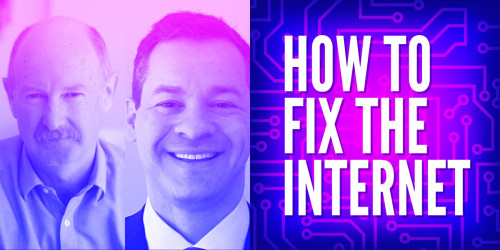People who want their day in court should be able to have it. That's why EFF has long opposed forced arbitration agreements—agreements that require people to resolve conflicts without going to court—because they place unfair limits on one’s ability to exercise their fundamental rights. Too often, they also act as a get-out-of-jail-free card for companies.
There is a growing recognition that forced arbitration agreements impede the defense of fundamental rights. The U.S. Supreme Court hears three cases on forced arbitration this session, and the President recently signed a bill preventing victims of sexual assault and harassment from being forced to settle their claims through forced arbitration. Such clauses trapped these victims by requiring them to waive their rights to a day in court before they could possibly know there would be any reason to sue. More lawmakers should follow suit in recognizing forced arbitration violates our rights. In fact, they should go beyond recognition: they should put it in their laws.
EFF already believes that for data privacy legislation to be effective, it must have a private right of action, which expressly allows people to sue companies that violate their rights. In line with that principle, we also support bills that bar forced arbitration agreements, also known sometimes as pre-dispute arbitration agreements.
An Old Law Gone Bad
Pre-dispute arbitration agreements provide that the parties to a contract must resolve any future legal disputes about that contract through arbitration and not court. The original intent was to create an efficient way for businesses with comparable bargaining power to negotiate and agree upon an alternate means of conflict resolution. In 1925 Congress enacted the Federal Arbitration Act (FAA) to mandate enforcement of some of these agreements.
Judges have long recognized there is a power imbalance inherent in such negotiations. In a 1967 case called Prima Paint Corp. v. Flood Mfg. Co., the U.S. Supreme Court explained that the FAA does not apply where “one of the parties characteristically has little bargaining power.” Justice Ginsburg likewise explained, in her four-Justice dissent from the Court’s 2018 expansion of the FAA in Epic Corp. v. Lewis:
The legislative hearings and debate leading up to the FAA’s passage evidence Congress’ aim to enable merchants of roughly equal bargaining power to enter into binding agreements to arbitrate commercial disputes. … Congress never endorsed a policy favoring arbitration where one party sets the terms of an agreement while the other is left to “take it or leave it.”
Beginning in the 1980s, however, the Supreme Court in a series of rulings greatly expanded the ability of businesses to use the FAA to enforce arbitration clauses that businesses unilaterally place into their agreements with ordinary consumers. For example, the Court allowed businesses to use the FAA to avoid being sued in state as well as federal court, and even to avoid class action suits altogether. Put another way, the Court made it so businesses could require individual customers to sign away their legal right to sue in court. This opened the floodgates for businesses to insert arbitration clauses anywhere they could to protect themselves from being brought into court for their misconduct, at the direct detriment of consumers.
If the original intent of forced arbitration was to focus on negotiation and agreement between people and companies, it's clear that it's gone badly wrong. Here's a not-so-fun fact from a 2021 American Association of Justice report: "More people climb Mount Everest in a year (and they have a better success rate) than win their consumer arbitration case."
What Makes Forced Arbitration Forced and Unjust
When consumers buy goods or services from corporations, arbitration clauses are often buried in standardized contracts. These contracts typically are offered by a party with superior bargaining power (the corporation) to a party with lesser power (the consumer) on a take-it-or-leave-it basis. Such arbitration is forced, and not negotiated and agreed-to.
Consider EFF’s thwarted legal challenge to AT&T’s unlawful disclosure of customer location data. AT&T violated the rights of their customers by disclosing their real-time location information without consent, in violation of state and federal law, and contrary to AT&T’s own promises against disclosure. EFF represented AT&T customers in a class action lawsuit to end this ongoing privacy violation and hold AT&T accountable, along with our co-counsel at Hagens Berman Sobol Shapiro LLC. The court held that because AT&T customers sign an arbitration agreement when they buy a cellphone or service, they lose their legal right to sue the company in a court of law.
But these AT&T arbitration agreements were hidden within hundreds of pages of dense, small-font legalese. AT&T is a multi-billion dollar business with all the bargaining power. Rejection of the arbitration agreement would mean the inability to use AT&T services. To repeat, AT&T writes the contract without customer input or negotiation, AT&T buries the clause in documents that nobody reads, AT&T offers said contract to every customer, and if you don’t accept, you don’t get service. But if you do, you’ve signed away your legal right to sue them in court, even when they violate your legal rights, federal law, and their own corporate policy.
People forced into arbitration do not get the protections or advantages that come with civil litigation. Without the ability to join similarly wronged consumers in a class action, an individual’s case and its possible damages awarded becomes too small for most lawyers to offer representation. Also, compared to class damages in a civil lawsuit, individual damages from arbitration are too small to discourage corporate wrongdoing. Additionally, arbitration often denies the litigants a full opportunity to gather information from each other (called “discovery” in court), denies the general public a full opportunity to gather information about the often-secretive arbitration proceedings, and denies future litigants of legal precedent to inform further cases. Finally, arbitration denies consumers a jury of their peers, leaving them at the mercy of the arbitrators. Where arbitrators are often hired by the same business the customer has a dispute with, this inherent conflict of interest often leads to biased decisions in favor of the business.
Unfortunately these forced arbitration agreements are distressingly common. Whenever you select “I agree” on a long and confusing click-through contract to purchase something, and whenever you mark what’s called a “signature-capture device”—for instance, at a checkout counter—to get a good or service, you may be signing away your legal right to sue a business that hurts you.
Thanks to arbitration clauses, consumers have no choice but to sign away their fundamental rights and give businesses a get-out-of-jail-free card, just to use a service.
EFF Supports Consumer Data Privacy Legislation That Bars Forced Arbitration
We need comprehensive consumer data privacy legislation. To ensure effective enforcement of these privacy laws, we also need a “private right of action,” so that consumers hurt by corporations can bring their claims to court.
Private rights of action are stronger when they also include a bar against forced arbitration agreements. This prevents businesses from burying a forced arbitration clause into the agreements we as consumers all must sign just to use their service.
A consumer data privacy bill that effectively addresses these particular concerns is U.S. Sen. Cantwell’s 2019 Consumer Online Privacy Rights Act (COPRA). COPRA not only had a strong private right of action that allowed any individual subjected to a violation to bring a civil suit, but also barred enforcement of forced arbitration agreements. We encourage more lawmakers to recognize their importance and include them in future legislation.
Consumer data privacy laws should put people in the best possible position to fight back against companies. That's why Congress should consider COPRA as the framework for consumer data privacy legislation, as the only bill that contains both a private right of action and a bar on forced arbitration. The last thing Congress should do is leave businesses that unlawfully harvest and monetize our personal information with a get-out-of-jail-free card.











